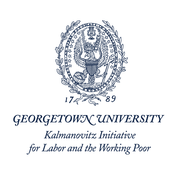This week, the Working-Class Studies Association will hold its annual conference. This year’s conference is special in two ways.
First, this year the WCSA is partnering with the Labor and Working-Class History Association for a joint conference. With two organizations involved, we expect more than 400 people to attend the Fighting Inequality conference and/or present their work. As always, the conference will include academic papers but also plenaries with activists, artists, and scholars from several disciplines talking about working-class issues. We’ll also have film screenings (in partnership with the DC Labor Film Festival), poetry and music performances, workshops, and a DC Labor History tour. All of that is pretty typical for a working-class studies conference, since the field has always been committed both to bringing more (and better) attention to class within the academy and to connecting in meaningful ways with working-class people and movements.
This year’s conference is also special because it marks the twentieth anniversary of the first working-class studies conference, which we organized with several colleagues at Youngstown State University in May of 1995. That conference helped to create the Center for Working-Class Studies (CWCS), the first of its kind in the US. That more than 150 scholars, activists, artists, and other interested folks came to Youngstown to spend a weekend talking about working-class lives demonstrated need to establish Working-Class Studies as an academic discipline. With support from the Ford Foundation in 2000, the CWCS helped to build that field, including several other centers around the US.
The conference also left us with two big questions that would shape our work at the CWCS. One was inspired by composition scholar Gary Tate, who reminded us of the value of supporting and facilitating other people’s work – an essential form of academic labor. At the conference, Tate spoke with a number of participants about his next project: an edited collection exploring how teachers’ class backgrounds shaped their work in the classroom. Editing a book wasn’t new for Tate. He’d helped develop composition studies through this kind of facilitative labor. Moving forward from the conference, one of the questions we asked ourselves was “How will the work we’re doing help to develop the field?”
That question led us to another: “Working-class studies for whom?” From the beginning, we believed that those of us engaged in working-class studies should pursue two ideals. First, building a field had to be about more than creating a space for our own work. On the academic side, we focused on outreach and organizing, trying to engage colleagues from across the disciplines with research and teaching about class. Even more important, we needed to reach beyond academic work, to ensure that we did not approach the working class merely as the object of study. We needed to collaborate with working-class people and communities, in local unions halls, in our classrooms, in political and organizing campaigns.
We were always concerned that working-class studies could become overly theoretical and distant from working people’s lives. We committed to writing and speaking in accessible, inclusive ways, and we also looked for opportunities to reach beyond academic audiences. Working-Class Perspectives is one result of that effort. We hoped that what we wrote and posted here would reach not only other academics but also workers, students, and journalists. Commentaries from Working-Class Perspectives have led dozens of journalists from print and broadcast journalism to interview our contributors, and the blog is assigned reading in many high school and college courses. In our first year, 2008, WCP had about 7500 hits. In 2014, we had almost 107,000 views from readers in more than 100 countries. One recent post was read by over 10,000 people within three days.
We have good reasons to celebrate this week’s anniversary. We have not done all of the things people suggested at the closing plenary of our first conference. When we asked, “If there was a Center for Working-Class Studies, what would it be doing?” our colleagues generated over 180 suggestions that ranged from basic vocational education to “starting a revolution.” Florence Howe cornered us afterward with wise advice: “pick five.”
At first, the Center for Working-Class Studies was an information clearinghouse and orphanage for academics who thought no one else on their campuses cared about class. Over time, the CWCS Studies helped launch working-class studies as an academic field of inquiry that engages in a wide range of academic and activist work. Along with publishing articles and books, we and our colleagues teach hundreds of courses about class, collaborate with workers and our students to create films and exhibits about working-class stories, work on labor issues and campaigns, help non-profit organizations understand how class shapes their work, and work with unions and other organizations on issues of peace, climate change, and electoral politics.
A few years ago, we announced that the CWCS was closing, but a few of our colleagues at YSU are trying to revive it. While their work is just beginning, our work continues on through the Working-Class Studies Association and the Center Working-Class Studies Legacy Fund,* which helped fund this year’s conference. We look forward to seeing many of our readers at Georgetown University this week, where we’ll talk about all of this work, toast to twenty years of working-class studies, and consider how we can continue fighting inequality.
Sherry Linkon and John Russo
Founding Members and Former Co-Directors
Center for Working-Class Studies
*If you would like to contribute to the CWCS Legacy Fund to support the future of working-class studies, please download this donation form. Thanks for your help.


Pingback: Twenty Years of Working-Class Studies | Working-Class Perspectives | Activate! Justice: Talk about money and moral wrongs